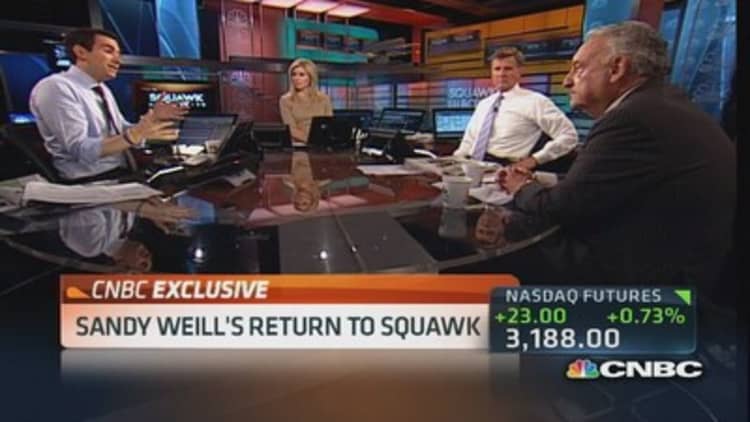
Former Citigroup chairman and CEO Sandy Weill has not spoken to his one-time protégé Jamie Dimon in a while, but he told CNBC on Tuesday that he'd welcome a phone call from the JPMorgan chief.
Right after the merger of Travelers Group and Citicorp in 1998, Weill fired Dimon, abruptly ending a 15-year partnership that saw them build a financial services empire like no other at the time.
Dimon was doing "very well and he thought he was ready to run the company and he probably was," Weill admitted during a "Squawk Box" appearance. "But the only problem was, I wasn't ready to retire."
"So we began to not cooperate," Weill continued, "and that was not a good way to try and run a business."
Weill said he has not talked to Dimon recently, but joked that he's "open to receive a call, if he calls me."
Read more from Sandy Weill's "Squawk Box" interview:
No bank breakup needed with right regulations, says Sandy Weill
Sandy and Joan Weill make $100 million donation
CNBC.com op-ed: Philanthropy isn't just money
Weill also said the infamous "Greenbrier incident" involving Dimon and another executive did indeed happen. He described it as "a little fight on the dance floor," which happened at a company function at the West Virginia resort right after the Citigroup deal.
As for Dimon's ability as chairman and CEO at JPMorgan, Weill said, "Jamie is very smart, and I think he knows the business probably—the whole business—as well as anybody that's in the business."
"JPMorgan did better than any company through the recession," he continued, "and came out of it stronger."
Weill said Dimon made a mistake when he initially talked about the "London Whale" trading losses as being a "tempest in a tea pot"—comments Dimon has repeatedly apologized for. Those losses eventually added up to more than $6.2 billion, and had resulted in Dimon being summoned to testify before Congress.
"I think it's very fashionable to go after bankers," Weill added. "So Jamie's turn at bat is now."
The "Whale" fiasco had also led to a very public debate heading into JPMorgan's annual meeting last spring, over a proposal by activist investors to strip Dimon of his chairmanship. The shareholder vote had ended up going his way and he kept both titles.
Addressing the school of thought that companies would be better off separating the chairman and chief executive officer jobs, Weill countered that "it's a much better model to have the same person being … chairman and CEO than splitting those positions."
"If you look at the companies in Europe that have these split relationships, they not only haven't done better, they've done worse," he argued—adding that he liked being both chairman and CEO because he got to "set the agenda."
—By CNBC's Matthew J. Belvedere. Follow him on Twitter @Matt_SquawkCNBC.



